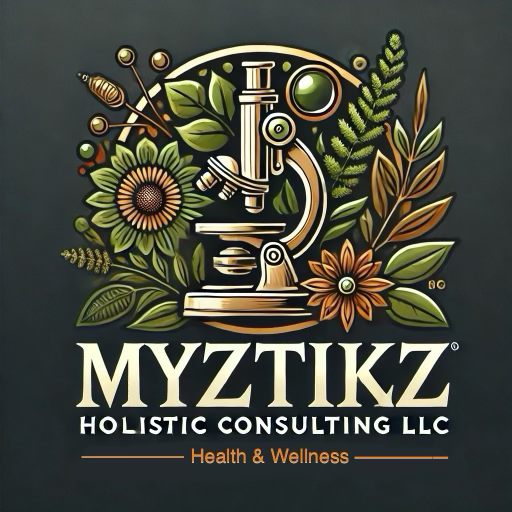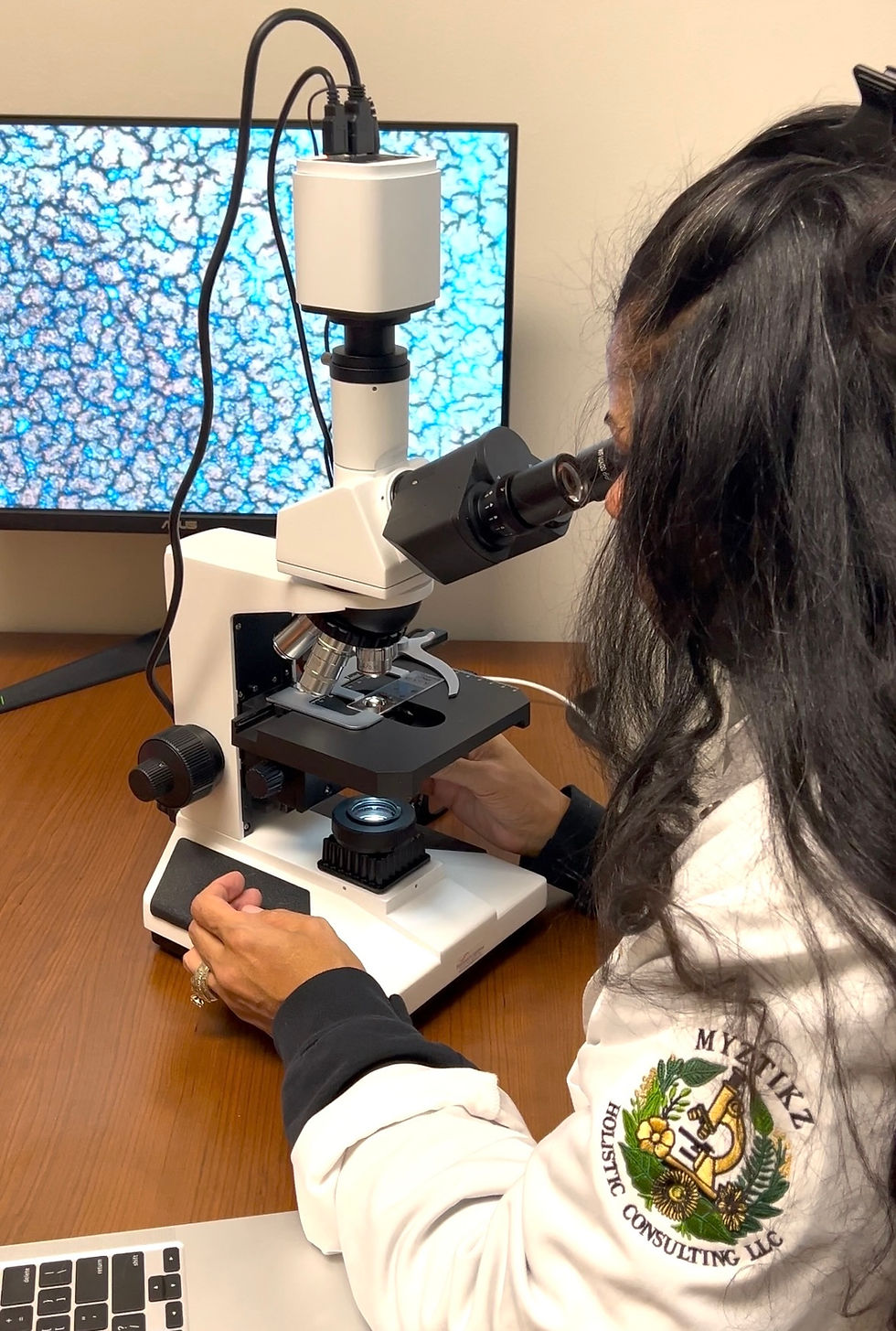Herbal Allies for Liver and Cholesterol Wellness: Nourishing the Body Naturally
- Myztikz Holistic Consulting

- Oct 9, 2025
- 6 min read
Updated: Dec 4, 2025

When people think about wellness, the focus often goes straight to diet, exercise, or stress management. Yet one area that's often overlooked is the important connection between the liver and cholesterol balance. These two systems play a central role in the body's overall vitality. The liver quietly works behind the scenes to process nutrients, filter waste, and regulate hormones. Cholesterol and related lipids, meanwhile, provide the raw materials for cell membranes, vitamin D, and hormone production. Supporting these functions in balance creates a strong foundation for long-term wellness.
The Liver's Role in Wellness
The liver is a powerhouse organ that:
Supports detoxification, helping filter toxins and metabolic waste.
Assists in digestion by producing bile for breaking down fats.
Balances hormones and blood sugar, regulating how energy is stored and used.
Plays a role in cholesterol and triglyceride metabolism, making and clearing fats and cholesterol as needed.
When the liver is under stress, it can contribute to sluggish digestion, toxin buildup, elevated cholesterol, or high triglycerides.
The liver produces most of the body's cholesterol, packaging it into bile acids and lipoproteins for transport and elimination. This natural process supports hormone balance, cell repair, and vitamin D synthesis- showing why the liver's role in cholesterol is so vital to overall wellness.
Understanding Cholesterol and Triglyceride Balance
Cholesterol is not "bad"- it is necessary for the body. What matters most is balance and movement:
HDL (High Density Lipoprotein): Sometimes called "good cholesterol," HDL helps carry cholesterol away from the arteries and back to the liver.
LDL (Low Density Lipoprotein): Sometimes called "bad cholesterol," excess LDL can deposit in artery walls if not balanced by HDL.
Non-HDL Cholesterol: This number represents all cholesterol types that can potentially contribute to plaque buildup (LDL plus other particles). It's considered an important marker for cardiovascular wellness, because it reflects total risk beyond just LDL alone.
Triglycerides: A type of fat in the blood that stores unused calories for energy. High levels are often linked with diets high in sugar or refined carbohydrates and can stress both the liver and cardiovascular system.
👉 An important note: The Liver's Role in Cholesterol Production: The liver, along with the intestines, produces up to 80% of the body's cholesterol from glucose, fats, and amino acids. This internally synthesized cholesterol supports cell structure, hormone production, and bile acid formation- essential for digestion and fat metabolism.
These nutrients are converted into acetyl-CoA, a key molecule made from fats, sugar, and proteins. From there, they move through the HMG-CoA reductase pathway, which acts as the main "switch" for cholesterol production and is the same pathway that statin drugs are designed to block. Only about 20% of cholesterol typically comes directly from dietary sources, which means dietary choices still matter- but supporting liver and intestinal health is central to maintain overall cholesterol balance.
Maintaining a balanced cholesterol and triglyceride profile supports healthy circulation, cellular function, and long-term vitality.
Simple Analogy: Baking Bread & Cholesterol
Think of your liver like a bakery:
Acetyl-CoA is the flour- the basic ingredient made from breaking down sugars, fats, and proteins.
HMG-CoA reductase is the head baker- the one who decides how much bread (cholesterol) will be made.
Statins work like a rule that limits the baker's work- slowing down production so less cholesterol is created.
Just like in a bakery, the quality of the ingredients and how the baker works both affect the final outcome.
Herbal Allies for Liver and Cholesterol Wellness
For generations, herbs have been used to support liver health and promote balanced cholesterol. While they are not substitutes for medical treatment, herbs can be part of an overall proactive wellness lifestyle. Milk thistle, for example, has long been valued for supporting liver function, while burdock has traditionally been used to encourage natural cleansing pathways and healthy circulation. When paired with supportive foods like sunflower lecithin, fiber, and low-glycemic fruits, these allies reflect how herbs and nutrition together can encourage balance and long-term vitality.
Nutrition & Lifestyle Notes

Alongside herbs, everyday choices strongly influence the liver and cholesterol:
Fiber-rich foods such as beans, vegetables, fruits, and whole grains can help bind excess cholesterol. If choosing oats, whole or steel-cut oats are considered the best quality. They may be beneficial in moderation, but like other high-phytate foods, they can also bind to minerals and reduce absorption if over-consumed. Balancing oats with a varied diet helps reduce this concern.
Low-glycemic fruits such as berries, green apples, pears, and citrus provide fiber and antioxidants that support circulation and liver balance, while being less likely to raise triglycerides.
Leafy greens support natural detox pathways and provide chlorophyll, which assists liver wellness. Some greens are high in oxalates (natural compounds found in plants) that can bind to minerals like calcium or magnesium if consumed in excess. This doesn't mean they should be avoided, but rather enjoyed in balance as part of a varied diet. Rotating different leafy greens helps reduce this effect while still giving the body important nutrients.
Magnesium-rich foods (pumpkin seeds, leafy greens, legumes) support cardiovascular and liver balance.
Sunflower lecithin- A natural source of phospholipids that may help support fat metabolism, liver function, and balanced cholesterol and triglyceride levels.
Staying well hydrated supports liver function and toxin clearance.
Supporting healthy digestion and bile flow also helps maintain cholesterol balalnce, since sluggish elimination or constipation may contribute to eleveated cholesterol levels. Both extremes- too little or too much cholesterol- can impact hormone balance, nerve function, and circulation, reminding us that the body thrives in equilibrium.
Statins: Mainstream and Holistic Perspectives
In mainstream medicine, statins are commonly prescribed to lower cholesterol levels by blocking an enzyme in the liver called HMG-CoA reductase. This enzyme converts acetyl-CoA- a product made from glucose, fats, and amino acids- into cholesterol. Since the liver produces about 80% of the body's cholesterol, this pathway is a central focus in cholesterol management.
From a holistic perspective, statins work directly through the liver, the same organ responsible for producing most of the body's cholesterol. This can place extra demand on the liver and may show up as elevated liver enzymes during routine blood tests. This signal that the liver may be under stress and needs monitoring.
Holistic wellness emphasizes supporting the liver gently through foods, herbs, and lifestyle practices- whether or not a person is taking statins.
Contraindications & Precautions with Statins
When considering liver and cholesterol wellness, both mainstream and holistic perspectives bring important precautions:
Statin-Related Precautions:
Statins can elevate liver enzymes, which is why blood work is often recommended to monitor liver function.
Prolonged use may contribute to liver or muscle tissue changes, sometimes described as fibrosis (scarring) or myopathy. This highlights the importance of long-term monitoring.
Statins may reduce the body's natural production of CoQ10, a nutrient important for muscle energy and cardiovascular support.
Some individuals report muscle fatigue, weakness, or digestive changes while on statins.
Because statins work through the liver, combining them with strong liver-focused herbs or supplements should be approached cautiously.
While it's important to be mindful of individual sensitivities and how certain herbs or foods may interact with the body, it's equally valuable to understand how the body naturally manages balance- particularly through the liver and cholesterol regulation process.
Understanding Cholesterol's Role in the Body
Cholesterol plays several important roles in the body. Beyond its connection to diet, it's a vital component of every cell membrane and is used to make essential hormones such as estrogen and testosterone. It also serves as a building block for vitamin D and for the bile acids that support fat digestion. The liver and intestines naturally produce about 80% of the body's cholesterol, while the remaining 20% comes from dietary sources like animal products- including eggs, cheese, and meat.
Highly processed or fried foods can also influence overall cholesterol balance, as they often contain trans fats or refined oils that may affect how the body utilizes and regulates cholesterol. The liver helps maintain this balance by adjusting its own production based on dietary intake and by eliminating excess through bile.
By understanding this natural process, it becomes easier to see how nutrition, herbs, and mindful choices work together to support the body's internal equilibrium rather than disrupt it.
.
Conclusion
The liver, cholesterol, and triglyceride balance are central to how the body processes nutrients, regulates circulation, and maintains long-term vitality. Herbs such as milk thistle and burdock, paired with supportive foods like sunflower lecithin, fiber-rich produce, and low glycemic fruits, can offer gentle, consistent support. HDL, often called the "good" cholesterol", helps carry excess cholesterol back to the liver for recycling and elimination- another reason why healthy fats, exercise, and herbs that support circulation can be beneficial. Wellness becomes less about restriction and more about balance.
True wellness is about balance- nourishing the body so it can do what it's naturally designed to do.
👉 If you're interested in learning more about how your body reflects balance from the inside out, consider exploring Live & Dried Blood Cell Analysis. These educational sessions provide insight into wellness patterns, lifestyle influences, and ways to better support your body naturally.
Disclaimer: These statements have not been evaluated by the Food and Drug Administration (FDA). This article is for educational and informational purposes only. It is not intended to diagnose, treat, cure, or prevent any condition. Herbs and supplements may interact with medications, and certain practices are not recommended during pregnancy or nursing. Always consult a qualified healthcare professional before making changes to your wellness routine, and review possible precautions or contraindications. Statements made by Myztikz Holistic Consulting LLC are intended to support wellness education and self-awareness only.
👉 Always do your own research.
"If you found this article helpful, share it with someone who's curious about holistic wellness practices."



